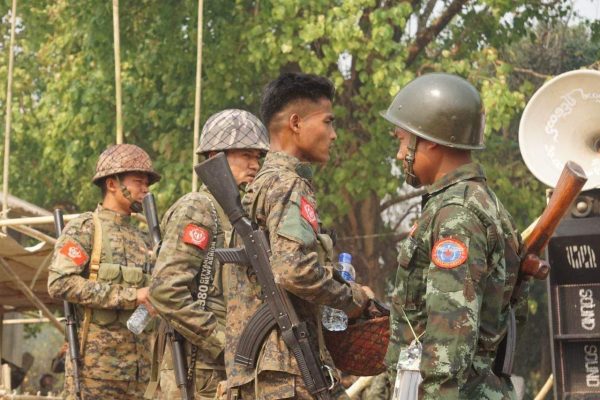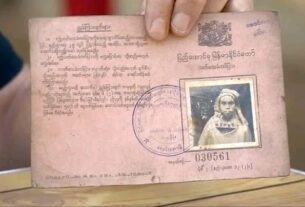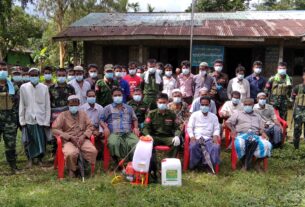“I lost all hope for my life”: Arakan Army accused of detaining Rohingya in forced labour camps
“Everyone had to work, even if they were unwell. If anyone refused, they were beaten.”
After nearly three months in what he described as a prison labour camp, *Sharif said he and dozens of other Rohingya received an ultimatum in mid-July from the Arakan Army (AA): remain in captivity in their native Myanmar or be expelled to overcrowded and increasingly unsafe refugee camps in Bangladesh where rations are dwindling.
The 29-year-old told The New Humanitarian these unthinkable options were presented to 78 people – including 20 women and 33 children – while they were being detained in a prison and forced to work for the AA in Rakhine, a state over which the armed ethnic group has gained significant control.
The group was a mix of returnees from the Bangladesh camps – detained by the AA on spurious charges – and local villagers brought to a work site that ended up being run like a prison. Sharif said men and women were separated and made to clean dirty drains, repair bridges, build roads, remove grass, and even clean houses in ethnic Rakhine villages near the town of Maungdaw for six hours each weekday. At night, Sharif said, the prison doors were locked, with guards posted to watch over the detainees, who were only allowed visitors on weekends.
Over the past decade, the AA – estimated to have some 30,000 soldiers – has expanded its control to 14 of Rakhine’s 17 townships as it seeks greater autonomy from the Myanmar government. It is considered the biggest threat to the ruling junta, which is also in conflict with numerous other armed ethnic and opposition groups.
“If you stay here in Myanmar, you will be sentenced to between five and 15 years in prison.”
Both the junta and the AA are accused of widespread ongoing abuses against the Rohingya, perpetuating a genocidal campaign that has driven around a million members of the Muslim minority to seek refuge in Bangladesh since 2016.
“You must go back to where you came from – Bangladesh,” Sharif recalled a Rohingya youth conscripted into the AA telling the elders in the camp. “If you stay here in Myanmar, you will be sentenced to between five and 15 years in prison.”
Statements like “where you came from” and “return to” are loaded: A group of Rohingya civilians going “back” to Bangladesh could be seen as an admission that Rohingya are migrants that are not entitled to Myanmar citizenship. But if they stayed, their presence could be deemed a de facto criminal offence by the AA and lead to years of servitude.
“We cannot survive in prison”
After two days of deliberations, including an offer to pay a fine for returning that was turned down by the AA, the five elders announced their collective decision – they would leave Myanmar.
“We can’t stay here any longer. After suffering three months in detention, we cannot survive in prison. We have decided to return to Bangladesh,” Sharif recalled them saying.
That decision came as a result of months of abusive conditions described to The New Humanitarian by several Rohingya witnesses as well as by a researcher who spoke to dozens of Rohingya victims in the Cox’s Bazar camps, not to mention by numerous rights organisations who have interviewed refugees from Rakhine.
What would become a torturous months-long ordeal began with a seemingly routine piece of security theatre.
In March, Sharif and several dozen other Rohingya were told to report to the local Arakan Army-run police station for photographs. Because the AA had already placed a travel ban in Rakhine and enacted a conscription programme, they thought it was yet another security measure.
“They took our photographs, then they brought us to the [police] ward saying they need to investigate us,” Sharif said.
The investigations, said *Musa Jahan, 32, were focused mainly on any possible connections they may have had to the Arakan Rohingya Salvation Army (ARSA), an armed Rohingya group accused of ties to the junta – and they were initially told that the process would only take 24-48 hours. Despite this, and the lack of proof of any links between the detainees and ARSA, 78 people ended up spending nearly three months in AA detention, working in a labour camp.
The New Humanitarian asked the AA to comment on the allegations but received no response in time for publication.
Ejaz Min Khant, a researcher and rights activist, said victims in Cox’s Bazar told him the AA would often not even use the pretext of detention: They would simply go to village leaders and ask for anywhere from 20 to 50 men to report for work. “By the following day, the AA would come, take the men, and force them into hard labour,” he told The New Humanitarian.
“Everyone had to work”
“They had been using us for forced labour since the beginning of our detention,” *Bilal, an 18-year-old who had returned to Myanmar earlier this year to care for his ailing mother, told The New Humanitarian after being forced back to Cox’s Bazar.
“We had to carry large stones from the hills to vehicles, carry logs from the hills, repair bridges, clean roads, collect trash, and even work in other police stations. We were also forced to cook for them.”
Both Bilal and Sharif said that as soon as the work began, so too did the abuse.
“On the first day in custody, they beat us severely. They used switches, they hit us, and kicked us to beat us,” Bilal said of the violence inflicted on the men. “Everyone had to work, even if they were unwell. If anyone refused, they were beaten.”
The women were made to wash the uniforms of the AA members and clean the fish the AA forces would eat, the witnesses said. Like the men, the women were also subjected to frequent beatings: “There were two female police officers from the AA who beat the Rohingya women in detention if they were working slowly,” Bilal said.
*Shamima was among the female detainees.
She recalled witnessing a woman being beaten near her. “She was not feeling well and wanted to rest, but when she was taken out for work, the soldier beat her even though she pleaded with them,” she said.
All of the witnesses said that when people were ill, they were given “simple medicines”, even after several people came down with fever and skin infections from not being given proper supplies and time to wash themselves.
Shamima said even mothers with infants weren’t spared from working. Her own daughter, who was born in Bangladesh, was only two months old at the time of her detention. “I was forced to work even while she was crying, and when she would cry they would treat me so badly,” she said.
“If you don’t do as we ask and work for us, then you have to leave our land.”
Shamima said because the AA forces were ethnic Rakhine, there were clear cultural and language barriers between them and the Rohingya detainees. “They spoke in the Rakhine language, and whenever we asked them to repeat something, they started treating us very rudely,” Shamima said. “Whenever we were taken outside, they did not allow us to cover properly. Everyone could see us working there.”
The AA forces refused to allow the Rohingya to drink the same water as them, said Bilal: “Sometimes, we even had to drink dirty water – the same water we used for bathing, which was mixed with soap.”
The children, Bilal said, were largely spared the violence, but not the labour: They were made to act as water carriers and porters, transporting clothes, chairs and other goods for the AA.
“I lost all hope for my life. I thought I would die there,” Bilal said of the “torturous” experience in the prison work camp.
According to Min Khant, the researcher and rights activist, such stories are more than common among camp dwellers in Bangladesh. “Nearly 50% of the new arrivals I had interviewed in Cox’s Bazar said they faced these conditions,” he said.
He said the AA would tell Rohingya, including non-detainees in the villages, “If you don’t do as we ask and work for us, then you have to leave our land.”
But no matter how the people left, the exodus would not be free. Everyone above the age of 12 had to pay two million kyat, $952, to the Arakan Army in order to leave their own country. Though the AA did return their gold, mobile phones, and other possessions, they confiscated the money the workers arrived with, claiming it was for medical expenses. All of the released prisoners were told to have their families procure the funds within 48 hours or face a return to prison.
Drone bombings and attacks on villages
The forced labour camps are just one example of the alleged abuses the Rohingya face in Myanmar. Both the junta and the AA are also accused of mass killings and forced conscription of Rohingya civilians.
Recent reports show that despite the AA’s stated commitment to “protect the rights of all communities equally in the region”, their mistreatment and targeting of Rohingya Muslims has only worsened as they’ve wrested more territory from the junta and become the pre-dominant ethno-nationalist armed group taking on the military rulers.
Even as this pattern of abuse and violence has led more Rohingya to flee to Bangladesh, camp conditions there often force them to try and return to Myanmar, where they are once again subjected to abuse, violence, and discrimination.
Bilal, who has twice fled Myanmar for Bangladesh, told The New Humanitarian it was the AA’s increased violence that led him to flee Rakhine. When he originally fled in 2024, it was just as the AA was making headlines for alleged drone attacks and for shooting into local villages. He said at least 100 people from his village were killed by the AA in a two-month span in the summer of 2024: “They mostly targeted areas where many people were gathered.”
On the day he finally fled, he said more than 150 people lost their lives: “When I witnessed the killings, I saw a boat on the river with people fleeing to Bangladesh, so I also fled.”
The New Humanitarian could not independently verify the numbers or circumstances of his account but media and rights organisations have reported independently on “massacres” conducted by the AA.
Amidst all the chaos, Bilal lost track of his mother. It was only when he reached Myanmar that he heard she was able to escape the crossfire and reach his brother’s home. When she fell ill this spring, Bilal crossed the border back into Myanmar to take care of her because the health system in the country is in such dire straits.
Sharif, meanwhile, has tried three times – in 2017, 2024, and 2025 – to live in Cox’s Bazar, the world’s largest refugee camp. But for many Rohingya, life in Bangladesh is just a painful limbo away from their homeland, and so the cycle continues.
*The names of interviewees who were victims of forced labour have been changed to protect their identities for security reasons.
Ali M. Latifi from Kabul, Afghanistan. Additional reporting was provided by a Rohingya researcher based in Cox’s Bazar, Bangladesh. Edited by Andrew Gully.




